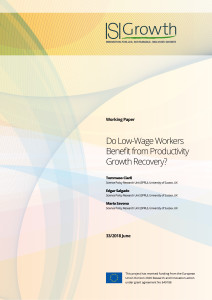This work examines empirically whether productivity gains (losses) are shared with wages, and the sources of heterogeneity that characterise this link. We use matched employer-employee data from the UK Annual Survey of Household Earning and the Annual Business Survey for 2011 to 2015. We instrument Labour Productivity (LP) with real Total Factor Productivity (TFP), and use matched worker-firm fixed effects to identify the causal effect of productivity changes on wages. We consider LP growth at the level of the firm, industry and city as affecting wages of continuing employees. We look at the effects on wages across different age cohorts (16-24, 25- 34, 35-65), wage quintiles, and unionised workers. We carry out the analysis on the whole UK economy and on the manufacturing sector, and several services (construction, trade, transport, financial, business services and creative industries) separately. We find that, overall, only (nominal) wage elasticity to industry-level productivity is statistically significant, very small and negative: -0.03. Elasticity is nil for manufacturing, and negative, albeit very small, for business services. We find the overall negative wage elasticity to industry productivity is concentrated in the 35-65 age cohort, and that unionisation at the industry level reduces rent sharing elasticity in the UK. These findings highlight a number of relevant policy issues that would add to the debate in the UK, for instance, on the Industrial Strategy, and on the identification of policy tools that would simultaneously improve productivity and wages.
Do Low-Wage Workers Benefit from Productivity Growth Recovery?
Tommaso Ciarli
Science Policy Research Unit (SPRU), University of Sussex, UK
Edgar Salgado
Science Policy Research Unit (SPRU), University of Sussex, UK
Maria Savona
Science Policy Research Unit (SPRU), University of Sussex, UK
Working Paper
33/2018 June

